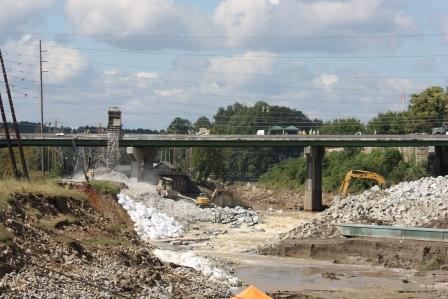Dams, debris and collaboration were the top three topics at a November House Ways and Means committee meeting where state and local officials discussed the aftermath of the October flood. The committee held a series of hearings to better understand the fiscal impact recovery efforts will have on the 2016-2017 state budget.

Initial repairs to Columbia Canal
A common theme of the city officials who testified at the hearing was the successful collaborative efforts among multiple jurisdictions.
Deron McCormick, Sumter’s city manager, responded to Rep. Gilda Cobb-Hunter’s question asking if he thought coordination among government entities in an emergency should be legislated. McCormick responded that on–the-ground coordination worked well during the flood emergency, and it would be important to maintain the flexibility currently in place for government entities to help each other. McCormick had high praise for the coordination among the city, county and state Department of Transportation in the rescue and recovery efforts.
McCormick pointed out there was substantial infrastructure damage in Sumter’s parks with debris settling on park benches and dugouts. He noted that, unfortunately, FEMA doesn’t reimburse for what he called "quality of life" landscaping in parks.
Arcadia Lakes Mayor Mark Huguley testified about how the flood damage has the potential to completely change the identity of his small town. He explained how his "Town of Seven Lakes" is now a town of four lakes, and these lakes were the reason many people bought homes there.
Huguley noted there are 16 lakefront homeowners in the town who still do not have direct access out of their neighborhood because of washed-out roads. He noted, among other issues, there is a state road that runs over a private dam which DOT cannot repair until the dam is repaired.
Columbia City Manager Teresa Wilson also testified about the collaborative efforts that took place in the Midlands area during and after the flood. She said city and county officials have remained in daily contact since the flood.
Wilson described Columbia’s destruction in terms of numbers. She noted two feet of rain fell in less than 48 hours, which amounted to 11 trillion gallons of water. Typically, Columbia receives less than four feet of rain each year.
A 60-foot section of the Columbia Canal, which supplies raw water to the city’s downtown water treatment plant, washed away. This breach caused the city to issue 10-day boil water advisory which affected 375,000 customers. Wilson said this was the first system-wide boil water advisory in anyone’s memory.
Wilson reported that 3800 tons of debris had been removed throughout the city, an amount that did not include waterway debris. In terms of repairs, Wilson said the city identified $1.5 million in road repairs but noted all the damage was not known yet. Plus there is a $40 million price tag to repair the canal to its previous condition and another $50 million for mitigation to prevent future failures.
After hearing similar testimony from county officials, committee members received revenue projections for the upcoming fiscal year from the state Revenue and Fiscal Affairs Office. Frank Rainwater, the state’s chief economist, reported a $343 million increase in recurring revenue for FY 16, a $380 million increase for FY 17, plus a $131.4 million surplus from FY 15.
What these increases will mean for flood recovery and the needs of state agencies will certainly be a hot topic during the early days of the 2016 legislative session.
